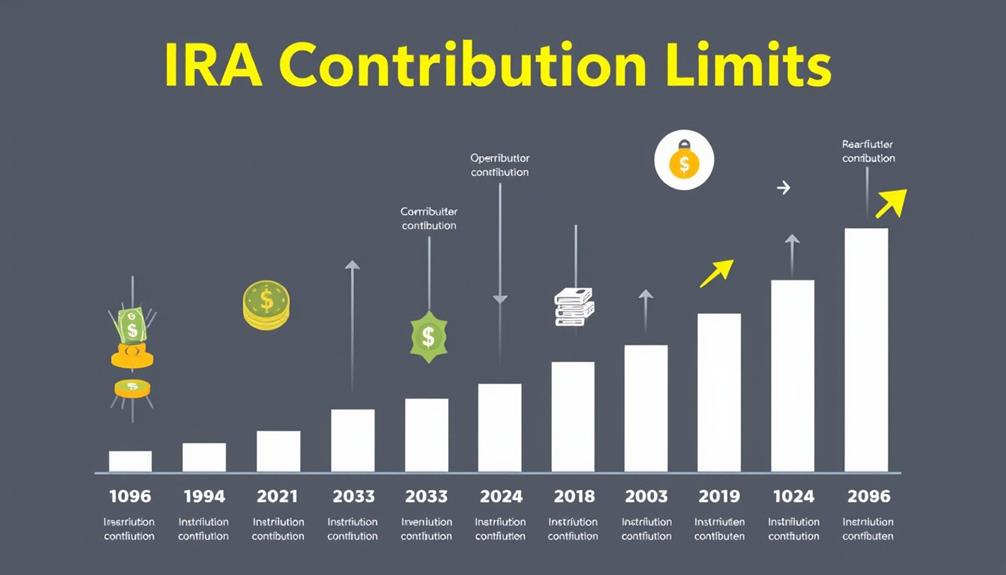In South Dakota, you will not be subject to state income tax on your IRA withdrawals, providing a valuable advantage for maximizing your retirement funds. In addition, there are no estate or inheritance taxes, further bolstering your financial stability. Although federal taxes still apply to these withdrawals, understanding the state’s tax-friendly environment enables you to plan effectively. Furthermore, other types of retirement income, such as Social Security, are exempt from state taxes. Therefore, as you prepare for retirement, it is important to consider the overall tax implications on your finances in order to optimize your savings. There is much more to discover about optimizing your retirement.
Key Takeaways
- South Dakota does not impose state income tax on IRA withdrawals, maximizing your retirement savings.
- Federal taxes apply to IRA withdrawals, taxed as ordinary income at rates of 10%-37%.
- Early withdrawals from IRAs before age 59½ may incur a 10% federal penalty tax.
- Roth IRA withdrawals can be tax-free under specific conditions, aiding in tax strategy.
- Understanding federal tax implications is crucial for effective retirement income planning in South Dakota.
Overview of South Dakota Taxes

When it comes to taxes, South Dakota stands out as a haven for retirees. The state boasts no state income tax, meaning you can enjoy all forms of income, including Social Security benefits, without worrying about state taxation. This tax-friendly environment greatly eases your retirement costs, allowing you to stretch your savings further.
While the average property tax rate in South Dakota is 1.24%, which is higher than the national average, the absence of estate and inheritance taxes offers substantial financial relief. You won't have to fret about hefty taxes on your estate when planning for the future. This is a considerable advantage for those looking to leave a legacy for their loved ones.
Additionally, South Dakota's low sales tax rates further enhance its appeal. You can shop and spend with less worry about how much tax you'll pay.
Tax Treatment of IRA Withdrawals

When you withdraw from your IRA in South Dakota, you won't face any state income tax, which can really benefit your retirement planning.
However, remember that federal taxes may still apply to these distributions, so it's important to factor those into your financial strategy.
Understanding both the state tax exemption and federal tax implications will help you make informed decisions about your retirement funds.
State Income Tax Exemption
How do state tax policies impact retirees? In South Dakota, the absence of a state income tax means that your IRA withdrawals aren't subject to any state taxation.
This unique tax environment allows you to enjoy your retirement income without worrying about state-level taxes eating into your savings. All forms of retirement income, including distributions from your IRAs, remain tax-free, which is a significant advantage for retirees like you.
Additionally, understanding common financial terms related to retirement savings can help you make informed decisions. Because you won't face state income tax on your IRA withdrawals, you can maximize your retirement savings and keep more funds available for your needs.
While federal taxes may still apply to your withdrawals, South Dakota's favorable tax policies make it an attractive destination for retirees looking to stretch their retirement income further. This means you can enjoy more financial freedom and stability during your golden years.
This tax exemption encourages many retirees to relocate to South Dakota, enhancing their quality of life and financial security.
Federal Tax Considerations
Understanding federal tax considerations is essential for anyone planning to withdraw from their IRA. When you take IRA withdrawals, you'll generally be subject to federal income tax.
For traditional IRAs, distributions are taxed as ordinary income, with rates ranging from 10% to 37% based on your total taxable income. If you're withdrawing from a Roth IRA, those withdrawals can be tax-free, provided you've held the account for at least five years and are over the age of 59½.
If you're considering early withdrawals—before reaching 59½—you might face an additional 10% federal penalty tax unless you qualify for certain exceptions.
It's vital to factor in these penalties when planning your retirement income strategy.
Social Security Income Tax Status

Why should retirees consider South Dakota for their Social Security benefits? South Dakota stands out as one of the few states that don't impose an income tax on Social Security. This tax-friendly approach allows you to receive your full benefits without the burden of state taxation, which can greatly enhance your financial well-being in retirement.
Here are some key advantages of living in South Dakota regarding Social Security:
- No state income tax on Social Security benefits.
- Tax-free withdrawals from retirement accounts, including pensions.
- Greater disposable income, allowing for better budgeting and spending.
- Overall tax structure supports a comfortable retirement lifestyle.
- Attractive option for retirees seeking tax relief and financial stability.
Even though federal taxes may still apply, the absence of state tax means you can enjoy your benefits more fully.
If you're considering where to retire, South Dakota offers a compelling advantage for those looking to maximize their Social Security benefits and minimize tax implications on their retirement income.
Other Retirement Income Tax Status

Retirees often overlook the tax implications of their retirement income, which can greatly impact their financial situation. In South Dakota, you're in a favorable position when it comes to taxation. All forms of retirement income, including distributions from IRAs, 401(k)s, and pensions, are exempt from state income tax. This means that you can withdraw funds from your IRA without worrying about state-level taxation, allowing you to save more for your living expenses.
Additionally, Social Security benefits aren't taxed at the state level, enhancing the tax-friendliness for retirees relying on fixed incomes. While you might still face federal taxes on your IRA withdrawals, South Dakota's lack of state income tax provides significant savings compared to states with higher tax rates.
However, it's essential to recognize that South Dakota has a higher average property tax rate of 1.24%. Despite this, the untaxed retirement income allows you to allocate more of your funds where you need them most.
Property Tax Considerations

When you're planning for retirement in South Dakota, it's essential to take into account property tax implications.
With an average rate of 1.24%, property taxes can impact your overall budget, even if the state has no income tax on IRA withdrawals.
Fortunately, programs exist to help low-income seniors manage these costs, offering exemptions and reductions that can ease your financial burden.
High Property Tax Rates
Maneuvering high property tax rates can be a significant consideration for those planning to retire in South Dakota. With an average property tax rate of 1.24%, higher than the national average, it's crucial to factor in how this impacts your overall housing costs.
However, the median home value in South Dakota is approximately $187,800, which can help balance out those costs.
Here are some things to keep in mind about property taxes in South Dakota:
- Property tax exemptions are available for eligible low-income seniors.
- High property tax rates can affect your retirement finances.
- There's no state income tax, which can offset some of the property tax burden.
- Local property tax rates vary, so research your specific area.
- Affordable living is possible with careful planning and budgeting.
Senior Tax Assistance Programs
Steering through property tax obligations can be intimidating for seniors, especially in a state like South Dakota with its average rate of 1.24%. If you're living on a fixed income, these rates can pose significant financial burdens.
Fortunately, there are senior tax assistance programs designed to help you manage these expenses. South Dakota offers various property tax exemptions and reductions for seniors, which can alleviate some of the stress associated with higher property taxes.
If you qualify as a low-income senior, you may find specific programs aimed at assisting with your property tax bills. These programs can provide vital relief, allowing you to keep more of your retirement income for other needs.
However, property tax exemptions can vary by county, so it's important that you check with local officials to understand the benefits available in your area.
Keep in mind that while South Dakota doesn't have a state income tax, which helps you retain more of your retirement income, it's important to stay informed about any state tax implications affecting your IRA withdrawals and overall financial situation.
Exemptions for Low-Income Seniors
Low-income seniors in South Dakota can take advantage of property tax exemptions that greatly lessen their financial burden. These exemptions are essential, especially when you're on a fixed income and facing financial pressures.
If you're a qualifying senior aged 65 or older, you might be eligible for a property tax freeze, which stops increases in your property taxes.
Here are some key points to take into account:
- Property tax exemptions can considerably reduce your tax burden.
- You can receive up to $2,000 in benefits through the state's relief program.
- Exemptions for retirement income help guarantee you keep more of your hard-earned savings.
- Income limits are set to determine eligibility, so be sure to check these criteria.
- South Dakota is one of the more tax-friendly states for seniors.
Sales Tax Implications

When considering the sales tax implications of IRA withdrawals, South Dakota stands out as a favorable option for retirees. With a low sales tax rate of just 4.5%, it's one of the best states for managing your budget. Plus, essential items like groceries and prescription medications are exempt from sales tax, further enhancing your affordability.
Here's a quick overview of sales tax benefits in South Dakota:
| Feature | Details | Impact on Retirees |
|---|---|---|
| Sales Tax Rate | 4.5% (up to 6.5%) | Low cost of living |
| Essential Items | Exempt from sales tax | More disposable income |
| State Income Tax | None | Maximize IRA withdrawals |
The absence of a state income tax means you won't face liabilities on your IRA withdrawals, allowing you to keep more of your funds for day-to-day expenses. This combination of a low sales tax rate and tax-exempt essentials helps retirees stretch their budgets further, making South Dakota an attractive destination for those living on fixed incomes.
Planning for Federal Taxes

While South Dakota offers favorable sales tax benefits, planning for federal taxes on your IRA withdrawals is equally important.
Understanding how your withdrawals from retirement accounts affect your federal income tax can help you manage your overall tax liability. Here's what you need to contemplate:
- IRA Distributions are taxable: Withdrawals from traditional IRAs are taxed as ordinary income, affecting your adjusted gross income (AGI).
- Penalties for early distributions: If you take money out before age 59½, you may face a 10% penalty unless you meet specific exceptions.
- Impact on Social Security income: Higher AGI from IRA withdrawals may affect the taxation of your Social Security income.
- Tax year considerations: Be mindful of the tax year when planning your withdrawals, as the timing can influence your overall tax situation.
- Roth IRA benefits: If you're eligible, qualified Roth IRA withdrawals are tax-free, providing a strategic option for tax planning.
Frequently Asked Questions
Do You Pay State Income Tax on IRA Withdrawals?
No, you don't pay state income tax on IRA withdrawals in South Dakota. This means you can fully benefit from your retirement savings without worrying about state taxes, making it a great option for retirees.
What States Require Tax Withholding on IRA Distributions?
Imagine traversing a garden of states, where some demand a toll for every withdrawal from your IRA. States like California and New York enforce tax withholding, while others, like Florida, Texas, and South Dakota, don't.
What Are the Tax Implications of Withdrawing From an Ira?
When you withdraw from an IRA, you'll face federal taxes on the distribution. It's essential to plan accordingly, as these taxes can greatly impact your overall retirement income and financial strategy moving forward.
Do You Pay State Taxes on 401K Withdrawals?
No, you don't pay state taxes on 401(k) withdrawals in South Dakota. The state doesn't impose personal income tax, allowing you to access your retirement funds without worrying about additional state tax liabilities.
Conclusion
In South Dakota, your IRA withdrawals can be a double-edged sword. On one hand, you benefit from the lack of state income tax, which offers a significant advantage for retirees. On the other, you must navigate the complexities of federal taxes and manage your overall retirement income wisely. Balancing these factors is essential, ensuring you enjoy your hard-earned savings while minimizing potential tax burdens. Stay informed and plan strategically to make the most of your financial future.










